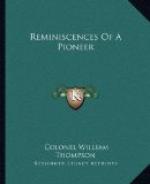Thus wore away the terrible winter of 1852-53. I say terrible, and the word but poorly expresses our situation during that memorable winter. To fully understand our situation one has but to imagine oneself in a strange land, far from human aid, save from those environed as ourselves. We were three thousand miles from “home,” surrounded by a primeval wilderness, in which ever lurked the treacherous savage. Happily for us and for all, no annoyance or real danger threatened us from that quarter. A few years before, a salutary lesson had been taught the savages. The deadly rifles of the pioneers had instilled into their bosoms a wholesome fear. Information had reached the settlers that the Indians contemplated a massacre—that they were going to break out. The information reached them through the medium of a friendly Indian. The result was that the settlers “broke out” first. A company was formed, consisting of about all of the able-bodied men within reach. The savages were encountered on the Molalley and after a sharp fight were dispersed or killed. Several were left dead on the ground. The whites had one man wounded. Thus the war power of the Molalleys was destroyed forever.
In this connection I wish to make a digression, which I trust my readers will pardon. It has often been urged that the white man has shown little gratitude and no pity for the aborigines of this country. This I wish to refute. The Indian that brought the word of warning to the white settlers was ever after the object of tender solicitude on the part of those whom he had befriended. I have seen that Indian, then old and possibly worse off for his association with civilization, sitting down and bossing a gang of Chinamen cutting and splitting wood for Dan’l Waldo. The Indian, “Quinaby,” always contracted the sawing of the wood at $2.00 per cord and hired the Chinamen to do the work for 50 cents per cord. He had a monopoly on the wood-sawing business for Mr. Waldo, Wesley Shannon, and other old pioneers. It mattered not to “Quinaby” that prices went down, his contract price remained the same, and the old pioneers heartily enjoyed the joke, and delighted in telling it on themselves.
But enough of this. Spring came at last and a new world burst upon the vision of the heretofore almost beleaguered pioneers. We had wintered on a “claim” belonging to a young man named John McKinney, two miles from the present town of Jefferson. He had offered his cabin as a shelter with true Western hospitality, including the free use of land to plant a crop. Accordingly about twenty acres were plowed and sown to wheat. This work was performed by my elder brothers. Meantime my father had started out to look for a claim. Nine miles north of Eugene City he purchased a “claim” of 320 acres, paying therefor an Indian pony and $40 in cash. To this place we moved early in May, and there began the task of building up a home in the western wilds. A small cabin of unhewn logs constituted the only improvement on the “claim,” but a new house of hewn logs was soon erected and a forty-acre field inclosed with split rails. We had plenty of neighbors who, like ourselves, were improving their lands, and mutual assistance was the rule.




